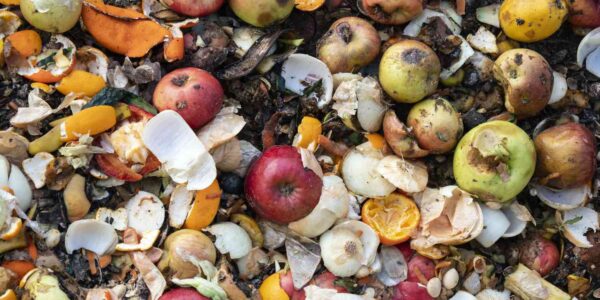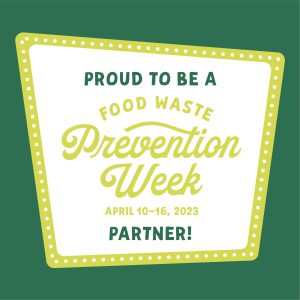April 10-16 is Food Waste Prevention Week!

How much food are you throwing away? Take note during Food Waste Prevention Week
Picture this: a mound of food, sitting in a landfill, weighing as much as 18,000 Subaru Outbacks. Seems like a lot, but that’s about how much food waste ended up last year in Knott Landfill alone: 34,000 tons! The Environmental Center’s Rethink Waste Project (RWP) celebrates Food Waste Prevention week in recognition of the need to end food loss and waste at home, work, and in the community. 
Ending food loss and waste requires purposeful action. Food Waste Prevention Week, April 10-16, 2023, is filled with engaging activities to raise awareness and inspire everyone to reduce food waste at home, work and in our communities. For more information on the Food Waste Prevention Week, visit www.foodwastepreventionweek.com.
Why does reducing food waste matter?
- Saves money – A family of four can save an average of $1800 per year.
- Conserves resources – Land, water, energy and human resources are used to grow, package and transport food.
- Improves food security – Safe and nutritious food that is currently thrown away could be rescued to increase access to healthy foods.
“Oregon DEQ estimates that over 15% of the waste stream going to landfills consists of food waste. For Knott Landfill, that means around 34,000 tons of food waste was disposed of at Knott Landfill in 2022,” notes Chad Centola, Director of Deschutes County Department of Solid Waste. To put that into perspective, that’s the equivalent weight of 18,000 Subarus!
The best way for individuals to practice reducing food waste is through small changes that start with your meal planning and purchasing habits. Unsure how to start? The Rethink Food Waste Challenge is a four week email series full of tips and tricks to help you reduce food waste, from meal prep and preservation to shopping tips and more! Sign up for the Food Waste Challenge this week to receive a free food scale to track your progress (pick up at The Environmental Center in downtown Bend). To find out more about the Food Waste Challenge and to sign up for the Rethink Waste monthly newsletter, visit www.rethinkwasteproject.org.
Once you’ve started by reducing the amount of food you throw out by meal planning, shopping smarter, and keeping food fresher for longer, you’ll also want to ensure the food you are discarding ends up being composted instead of being thrown in the landfill. Food waste in the landfill contributes to climate change by producing methane gas as it rots, instead of the organic material going back to growing more food when diverted to a compost pile. Did you know that many households have the option to compost curbside across Deschutes County? Within the city limits of Bend and Redmond, residents can place ALL food waste in your curbside yard waste bin along with your grass clippings and other yard debris. That includes fruits, vegetables, grains, meats, cheeses,coffee grounds, and cooked food. In Sisters, you can include raw vegetative food waste like uncooked fruits and vegetables in your curbside yard waste bin. All these food scraps are composted at our local Deschutes Recycling compost facility. Rusty Davis, Operations Manager with Republic Services, notes that “composting food waste not only saves space in the landfill but allows you to help with the recycling stream. Composted food waste will return to our community as compost for your lawns and gardens.”

The RWP joins various agencies and stakeholders throughout the country in a collaborative effort and shared commitment to reduce food loss and waste. Throughout the week, RWP will be sharing tips, trivia, local stories, and more on The Environmental Center’s social media challenges (Instagram @envirocenterbend and Facebook.com/TheEnvironmentalCenter) as well as through the RWP newsletter. You’ll also be in the loop for when more information is available about upcoming free, in-person Food Waste Reduction and Composting workshops in May – stay tuned!
Questions about Food Waste Prevention Week, or the Rethink Waste Project, can be directed to Udara via email – udara@envirocenter.org – or phone – 541-508-5439.